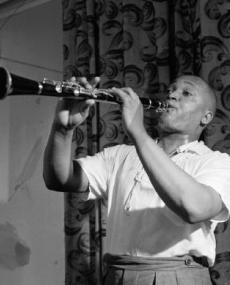
Isaac Zakes Nkosi, known to his fans as Bra Zakes, was born in Alexandra Township early in 1919. He started his schooling in Alexandra at a Catholic primary school, where he also began his music career. His sister Minah bought him his first saxophone. After matriculating, he formed his first music group.
Zakes Nkosi and Elijah Nkwanyane formed the cornerstone of the mbaqanga style of music. He played with the legendary Jazz Maniacs, formed by the popular Doornfontein shebeen pianist-turned-saxophonist, Solomon “Zulu Boy” Cele.
Mbaqanga (the name derives from Zulu, meaning something like “steamed maize bread”) developed to become an important genre of South African music. It is a blend of various styles, of which American jazz, marabi and kwela are the most important. Founded in the 1950s, mbaqanga soon took on a political dimension.
Zakes Nkosi recorded an album titled Our Kind of Jazz in the late 1950s.
He was a music writer for EMI, and he later worked at Gallo – not as a musician, but packing records in their storeroom.
He fathered five children and composed songs in their names. He played at weddings, festivals and parties, and every New Year’s Eve he would play at his home in 10th Avenue, Alexandra.
Bra Zakes produced three albums of jazz music.